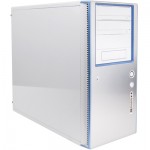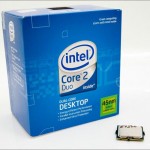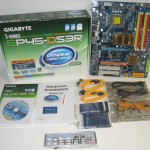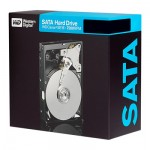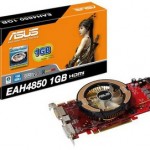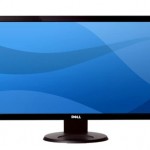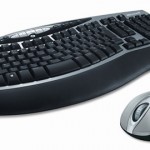It’s been a week or two since I started using my new computer full time and so I think the time is right to write a little review and share with you the reasons why I bought what I bought these parts in the first place. Here are the complete specs for my new work computer, including parts (monitor, Blu-ray drive) that I had purchased previously:
Intel E8500
Gigabyte GA-EP45T-DS3R
OCZ 4GB 1333 C9
2 x Western Digital 640GB WD6400AAKS
LG GGC-H20L Blu-ray/HD DVD reader, DVD writer
Asus 512 MB 4850
Dell S2409W 24″ 1080p LCD monitor
Antec Sonata Designer 500 case (includes 500W Antec EarthWatts power supply)
Microsoft Laser Desktop 4000
The E8400 has been the sweet spot, in terms of pricing and performance, for the upper end of the Intel Core 2 Duo line-up for some time now. Quad-core is nice, but it’s also expensive and unless you use apps optimized to use all 4 cores, the Core 2 Duos still represent better value for money and raw performance when it comes to these unoptimized programs (most games, for example). I went with the E8500 instead of the E8400 due to recent price rises (thanks to the low Australian dollar), certain parts, especially the popular ones, went up in price by greater amounts than the less popular ones. The E8400, being more popular, was only now about $30 cheaper than the E8500, whereas previously, the difference had been as high as $130. At $130 difference, the E8400 is clearly the better choice. At $30 difference, especially with the current socket coming to the end of life, it’s worth it to get a faster processor that will last a bit longer.
The motherboard sort of picks itself, as I like Gigabyte’s stuff and their EP45 series are well priced and very fully featured (eSata, on-board audio, 2 Ethernet ports, dual BIOS …). The only choice you have to make really is whether you want to use DDR3 or DDR2 memory (the ‘T’ in EP45T denotes a DDR3 only board). I went with DDR3 because it will probably be easier and cheaper to replace in the future, as DDR2 will be phased out soon by both Intel and AMD. I went with 4 GB (2 x 2GB) to give Windows and newer apps a bit of breathing room, and although it’s not the fastest RAM, it does run at 1333 MHz and I have the option to run it at slower speeds, with lower latency, if needed. It’s probably not worth spending more on RAM, as you get little out of it. I originally ran into problems with the OCZ RAM, as the ones supplied were faulty on arrival. This brings up the issue of testing, and it was obvious that the computer store (Computer Parts Land) I purchased from did not test this build at all. I can tell because the default RAM timings were used, and it is a well known thing that these OCZ RAM had wrong SPD settings for 1333 MHz operation (it shows 1.5v, but the RAM is actually 1.7v as stated on the OCZ website). If they had done testing at this original setting, the RAM would not have passed the required tests (Memtest86+). And this is a good time to recommend you test your system with Memtest86+ and other stress test tools before you install software on it – otherwise, you could end up wasting a lot of time like I did before I figured out that the random crashes were RAM related.
The HDD I had to decide between the Samsung or the WD AAKS series that I eventually picked. The Samsung is a bit more expensive, and I’ve heard of problems with faulty drives. Plus the AAKS 640 GB series is supposed to be one of the fastest mainstream drives around, and 640 GB sits nicely between 500 GB and 750 GB and offers a good compromise between these two sizes. I got two drives and run them in RAID 1 for improved data integrity, as this is my work computer and the data is more important than performance of a RAID 0 array (the “Russian Roulette of RAID”, that’s what I call it, because if one drive dies in a RAID 0 array …). The Blu-ray/HD DVD reader (and DVD writer) drive from LG I actually purchased several month ago due to a sale, and it’s great little drive that writes every kind of DVDs (including Lightscribe), and reads both HD formats which is necessary for me because I still have lots of HD DVDs (that’s now 3 HD DVD players that I have, the Xbox 360 add-on, the Toshiba standalone, and now the PC – this should ensure that my HD DVD collection remains playable for some time, especially considering that HD DVD reader drives are still being made).
I chose the ATi Radeon 4850 because it is the best “budget” 3D card that can play almost all the latest games at the highest quality and resolution. Maybe it will struggle with some games at 1600×1200 with high quality (and won’t play others in “ultra” quality mode), but you’ll have to pay double or triple the price for a GPU that does and it will be obsolete in no time. I do regret a bit not spending more money on a GTX 260, as it has CUDA support which means you can use it as a second CPU for applications such as video encoding. But at double the price, they’re not worth it at the moment and I can always grab a cheap one (possibly a GTX 280) when they do come down in price. There’s also the issue of these GTX cards being noisy compared to the 4850, plus the 4850’s more numerous stream processors actually give it GTX 260 like performances in certain games. To sum up, the 4850 represents the price/performance sweet spot for GPUs at the moment, especially if getting more FPS out of your system is not your top priority. The Radeon HD range is particularly good for Blu-ray playback, as it features full acceleration for all the video formats used by Blu-ray, not just the usual H.264 with partial acceleration for VC-1 like on Nvidia cards. I chose the Asus version because it comes with a custom heatsink-fan that reduces the heat/noise even further, and all at the standard price.
For the monitor, I’m using the Dell 24″ I got for cheap a couple of months ago due to a Dell pricing error. It’s great for playing HD movies due to the 1080p (1920×1080) native resolution, and for games as well, as more and more are now using console based HD resolutions (720p, 1080p), rather than the more traditional PC resolutions such as 1920×1200 (you may get letterboxing effect if you do uses these PC resolutions in multi-platform games such as Fallout 3). On the negative side, your choice of PC resolutions are greatly reduced if you want the full undistorted picture, and some cards do not even support certain resolution combinations such as 1600×900, which sits between the too low 1360×768 and the too high 1920×1080.
For the case, I chose the Antec Sonata Designer 500. The Antec Sonata range is all about quiet operation, at the expense of support for high performance systems (hence the small 500W power supply). The Designer range is new to Sonata, and I prefer it over the original black Sonata range (my other computer’s case). Just a note that despite the picture on the website and on the box, the case is actually white, not silver – only the front facade is silver. It’s still an excellent looking case, and the noise level is very low, and the case stays very cool to the touch (actually feels cold when touching the outside). For the keyboard mouse, I got the Microsoft Laser Desktop 4000 due to Microsoft having a cash back offer for it (so it only cost me $45 after cash back, when the normal pricing is $130). It’s a very nice combination, and much much better than my previously wired Microsoft pair or my Logitech wireless set on my other computer. Money well spent, I think.
So that’s my system. It’s not a budget system nor is it expensive, not the fastest gaming PC nor does it fail to play the latest games, and it’s not a quad core either, but it does a bit of everything and do them quite well. It does H.264 encoding in no time, plays Blu-ray movies with only 10% CPU utilization, can play Fallout 3 at full quality in 1920×1080 (I play it at 1360×768 with 4x AA in high quality mode), and can run Crysis at high quality if you don’t mind the framerates being a bit inconsistent at times.
As for Fallout 3, I’ve been playing it a lot recently. But the PC version is well known for being quite unstable, and crashes are quite common unless you do a few things. I managed to get the game to run for hours without crashing, and here are some tips on how to do this, as well as solve some bugs the games has:
- You have to ensure ffdshow is disabled for the video and audio decoding the game uses. This is especially needed if the game crashes on start up.
- The game seems to crash the more heavily pushed the GPU is, so even if Fallout 3 tells you you can run the game in “Ultra” mode, go back down one mode to “High” and the game will be a lot more stable.
- While some say that you cannot run Fallout 3 on an ATi card with both AA and HDR. That’s not true, because I’ve managed to do so without crashing or any side effects, but the previous point stands – if you’re pushing your system to the limit, the game will crash more often.
- If NPC disappear, especially in Megaton, then you can resurrect them on the PC version. This is a well known bug and characters such as Walter (the water plant, scrap metal guy) will disappear from time to time. This happens because they may fall off a platform into some null space somewhere. I’ve also had Billy Creel disappear on me, both him and Walter were at exactly the same null space place when I used the ‘player moveto’ command to find them.
- Save and save often. And don’t overwrite your saves. RPG are always save heavy, meaning that you almost need 100 saves before you complete the game. This is because certain actions and decisions you make can affect a lot of things, and you may miss out on certain optional quests if you don’t pay attention. With saves, you can sacrifice a few hours of game play to complete a quest that otherwise would have been unavailable. Plus, with the game crashing all the time, saves become even more important.
- If you plan on using Games for Windows to get the achievements and gamer points, log into “Live” before you start the game, as otherwise the achievements won’t be given.
That’s all for today, I think I’ve yapped on long enough.

